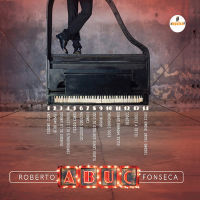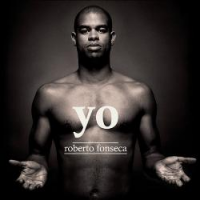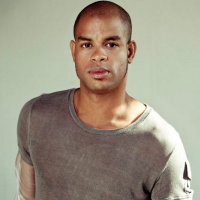Home » Jazz Musicians » Roberto Fonseca
Roberto Fonseca
Cuban music is currently enjoying a thriving renaissance; musicians from all over the island are performing in the world’s most prestigious venues, and pianists are undoubtedly the stars of this varied Cuban musical offer. Theirs is a golden generation, with renowned virtuosos displaying incredible technical prowess, and who’ve captured and charmed us. However, in the last decade, until now no one has emerged that is capable of brings together virtuosity and technique, and plays a music imbued with passion; with a unique, wordless voice that evokes feelings and makes us travel through different landscapes, a constant journey entering and exiting the island, without the need for a specific destination.
Born into a musical family in Havana in 1975, Roberto Fonseca remains faithful to the wish he has had from the beginning of his career: "I want my music to reach people who don’t know me, and I dream of one day becoming a reference for my audience…”
He started studying piano at the age of 8, though his initial passion was percussion. This interest at such an early age would clearly influence on his trademark “percussive” piano-playing style. At the age of 14, he created his first compositions, drawing inspiration from the Afro-Cuban genre, “At school we used to regard American Jazz as a reference; I felt that my music would be a fusion of both genres … I liked lots of jazz musicians, such as Herbie Hancock and Keith Jarrett, but also old American Funk and Soul classics.”
At only 15, his appearance as a pianist was a revelation at Havana’s Jazz Plaza International Festival; he finished his academic training as a pianist and teacher. After this, his desire to improve and learn further led him to study the Musical Composition Degree at the Instituto Superior de Arte (ISA).
At the age of 21, guided by the need to fuse his music with other styles, he started a tour across Italy with singer Augusto Enriquez, and his path would cross, one year later, with saxophonist Javier Zalba (Irakere, Cubanismo), with whom he formed the group “Temperamento”. This was the beginning of a 9-year journey which would culminate in his latest release “Zumazu.”
In a year of intense creativity,in 1999 he recorded and produced his first album “En el Comienzo”, which won the award for best Jazz album in the Cubadisco Festival; he co-produced, arranged and played for Augusto Enriquez’s album, “Cuando Yo Sea Grande”, and recorded his first solo album “Tiene Que Ver” which he released in 1999, and received an award for the popular Cuban music category in the Trimalca competition, organised by UNESCO .
Read moreTags
Roberto Fonseca: Viaggio oltre gli schemi e le barriere

by Paolo Marra
Figura di spicco del Latin jazz del nuovo millennio Roberto Fonseca racchiude in sé le eterogenee influenze europee ed africane che hanno caratterizzato l'evoluzione della musica popolare cubana, sua terra di origine. L'energia espressa con sorprendente tecnica pianistica affonda le radici nello spirito piu profondo delle tradizioni dell'isola caraibica tradotte, lontano da inutili stereotipi, in ponti di interscambio con più disparati contesti del funk, hip hop, jazz, elettronica fino ad arrivare a richiami decisamente più classici. A metà ...
read moreRoberto Fonseca, Christian McBride, King Oliver and More

by Joe Dimino
This week's show is book-ended by Latin jazz, as we take off with the talented Roberto Fonseca and we land with the multi platinum-selling Herb Alpert and his Tijuana Brass. In between, we focus on new releases by Christian McBride and Kansas City's own Todd Wilkinson as well as on the music of forward looking artists like Gebhard Ullmann, Nick Grinder and Michael Wang. Playlist Roberto Fonseca “Motown" Yesun (Mack Avenue Records) 00:00 Host talks 3:44 Miles Davis ...
read moreRoberto Fonseca: The worthy heir of Afro-Cuban Jazz
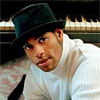
by Gabriel Medina Arenas
Success didn't knock on his door by random luck. Roberto Fonseca has worked hard to earn his reputation as one of the most renowned and skillful Cuban jazz pianists of his generation. The 38 year-old musician started playing drums when he was four years old and played at the International Jazz Festival of Havana when he was 15. Fonseca began his solo career when he was 24 and to date he has released seven studio albums and one ...
read moreRoberto Fonseca: Akokan
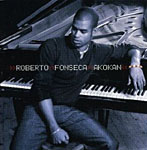
by Raul d'Gama Rose
In his follow-up to 2007's Zamazu (Enja/Justin Time), Cuban piano master, Roberto Fonseca deepens his journey into his quasi-mystical musical search. Like the mythical Gilgamesh, the pianist has embarked on a seemingly endless journey, a leap of faith into the musical unknown, to find the tonal center of pain and joy, heartache and ecstasy--and yes, in the tradition of the timeless myth, he has set the mystery and magic of artistry that courses through his veins down his hands, to ...
read moreRoberto Fonseca: A Life in the Spirit

by Raul d'Gama Rose
Recognition for the considerable talent of Cuban pianist, Roberto Fonseca has spread far and wide, and if there was another dimension to enter, it would be the one that qualifies an artist to greatness. However, Fonseca fights shy of any attention that distracts from his music. A deeply spiritual person, who just happens to express himself through his art, he prefers to defer to the mysterious and invisible force that compels him to make music.Fonseca worships at the ...
read moreRoberto Fonseca, Renaud Garcia-Fons, Daniel Humair, Michel Portal & Vincent Peirani perform at Souillac Jazz Festival this July

Source:
Erica Meltzer
The new jazz generation converges with its Afro-American roots this year at the Souillac Jazz Festival in southwest France, to be held from 15 to 21 July. SIX EVENING CONCERTS 16 July The Trio d'en bas will stage an entertaining and unusual spectacle in the Grottes de Lacave. 18 July The drummer Daniel Humair will lead his “Sweet & Sour” Quartet (double-bassist Jérôme Regard, saxophonist Emile Parisien [winner of the Jazz Academy’s 2012 Django Reinhardt prize] and accordionist Vincent Peirani ...
read more
Roberto Fonseca returns with "Yo"

Source:
ilkamedia
ROBERTO FONSECA “YO" New Album out 19 March 2012 Jazz Village/ harmonia mundi UK + UK TOUR
Roberto Fonseca is one of the most charismatic Cuban musicians of his generation. The Buena Vista Social Club® prodigy and Havana Cultura star has grabbed Cuban music by the horns and continued this party into the 21st century. His new album YO is out on 19th March and is his most daring one to date. Fonseca explores new sounds and dimensions, blending ...
read more
Cuban Pianist Roberto Fonseca Interviewed at AAJ...And More!

Source:
All About Jazz
Recognition for the considerable talent of Cuban pianist, Roberto Fonseca has spread far and wide, and if there was another dimension to enter, it would be the one that qualifies an artist to greatness. However, Fonseca fights shy of any attention that distracts from his music. A deeply spiritual person, who just happens to express himself through his art, he prefers to defer to the mysterious and invisible force that compels him to make music.
AAJ Contributor Raul d'Gama Rose ...
read more
Justin Time Records Set to Release Cuban Pianist Roberto Fonseca's "Akokan" in U.S. on February 16

Source:
DL Media
Justin Time Records Set To ReleaseCuban Pianist Roberto Fonseca's Akokan Available in U.S. Stores on February 16U.S. Tour Dates in Support of Cuban Legend Omara Portuondo“A fabulously gifted pianist, composer and band leader... a gift for melody that outshines more celebrated peers...one of a new breed who can transcend musical boundaries through sheer quality" -The Guardian “A genre-busting tour de force.. the lyricism of his playing recalls Herbie Hancock ...
read more

